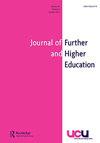Developing research-writer identity and wellbeing in a doctoral writing group
IF 2.4
Q1 EDUCATION & EDUCATIONAL RESEARCH
引用次数: 0
Abstract
ABSTRACT Various models of writing groups for doctoral candidates are effective in developing research writing skills. While most groups focus on writing and providing feedback, less is written about groups that focus on empowering the research-writer through social interaction. This paper explores the impact of an ongoing fortnightly writing group as a regulated writing space for promoting wellbeing and fostering research-writer identity among doctoral candidates, whilst developing cognitive and social skills. Eight participants and the facilitator reflect on the effectiveness of this group using collaborative autoethnography. What began as a group of higher degree research students who wanted to develop their research writing skills, became a supportive community of practice which enhanced individuals’ confidence to write, their research writing identities and wellbeing. Of significance was the writing expert as a facilitator. The study recommends that institutions value and create regular writing spaces for doctoral candidates to write, discuss their experiences as research-writers and in so doing, address their research writing identity and wellbeing, particularly given current concerns about mental health.在博士写作小组中培养研究作家的身份和幸福感
博士生写作小组的各种模式对培养研究写作技能是有效的。虽然大多数群体专注于写作和提供反馈,但很少有人关注通过社交互动赋予研究作者权力的群体。本文探讨了正在进行的每两周一次的写作小组作为一个受监管的写作空间对促进博士生的健康和培养研究作家身份的影响,同时发展认知和社交技能。八名参与者和促进者通过合作民族志反思了该小组的有效性。最初是一群想要发展研究写作技能的高学历研究生,后来成为了一个支持性的实践社区,增强了个人写作的信心、研究写作的身份和幸福感。重要的是写作专家作为促进者。该研究建议,各机构重视并为博士生创造定期的写作空间,让他们写作,讨论他们作为研究作者的经历,并在这样做的过程中解决他们的研究写作身份和幸福感,特别是考虑到当前对心理健康的担忧。
本文章由计算机程序翻译,如有差异,请以英文原文为准。
求助全文
约1分钟内获得全文
求助全文
来源期刊

JOURNAL OF FURTHER AND HIGHER EDUCATION
EDUCATION & EDUCATIONAL RESEARCH-
CiteScore
5.20
自引率
4.30%
发文量
80
期刊介绍:
Journal of Further and Higher Education is an international, peer-reviewed journal publishing scholarly work that represents the whole field of post-16 education and training. The journal engages with a diverse range of topics within the field including management and administration, teacher education and training, curriculum, staff and institutional development, and teaching and learning strategies and processes. Through encouraging engagement with and around policy, contemporary pedagogic issues and professional concerns within different educational systems around the globe, Journal of Further and Higher Education is committed to promoting excellence by providing a forum for scholarly debate and evaluation. Articles that are accepted for publication probe and offer original insights in an accessible, succinct style, and debate and critique practice, research, theory. They offer informed perspectives on contextual and professional matters and critically examine the relationship between theory and practice across the spectrum of further and higher education.
 求助内容:
求助内容: 应助结果提醒方式:
应助结果提醒方式:


